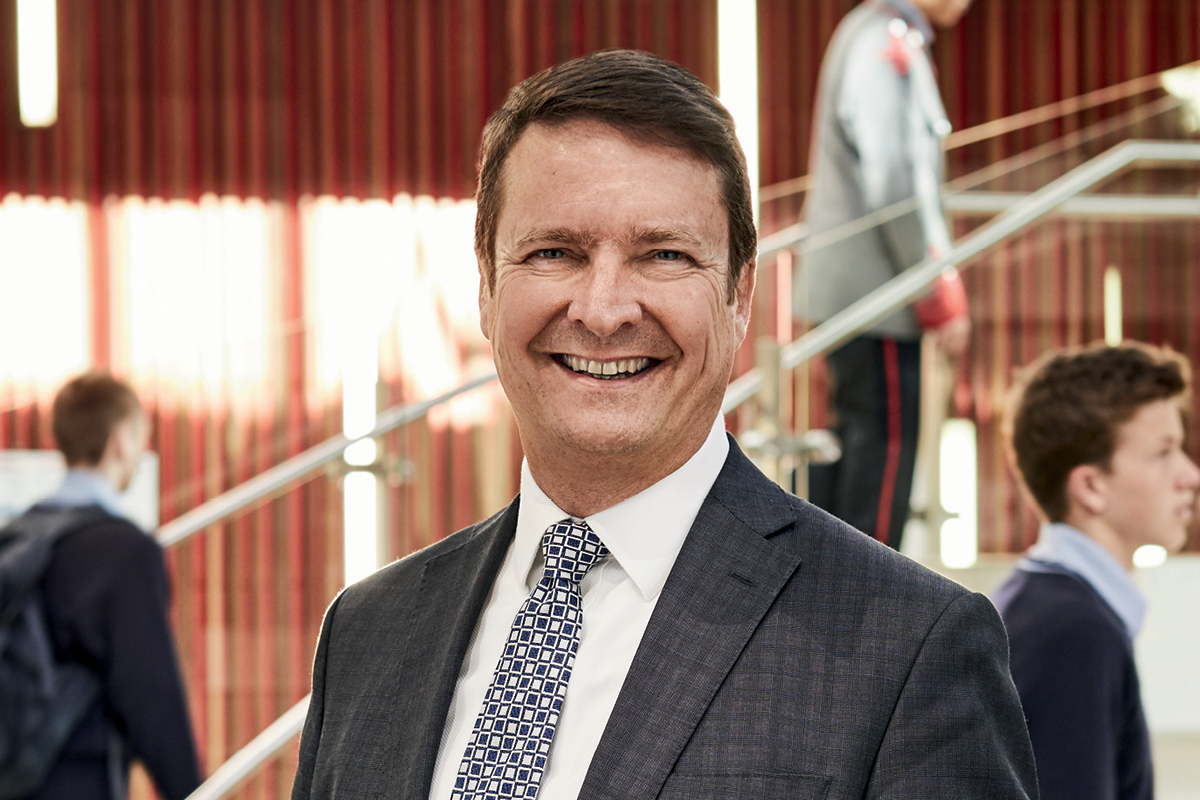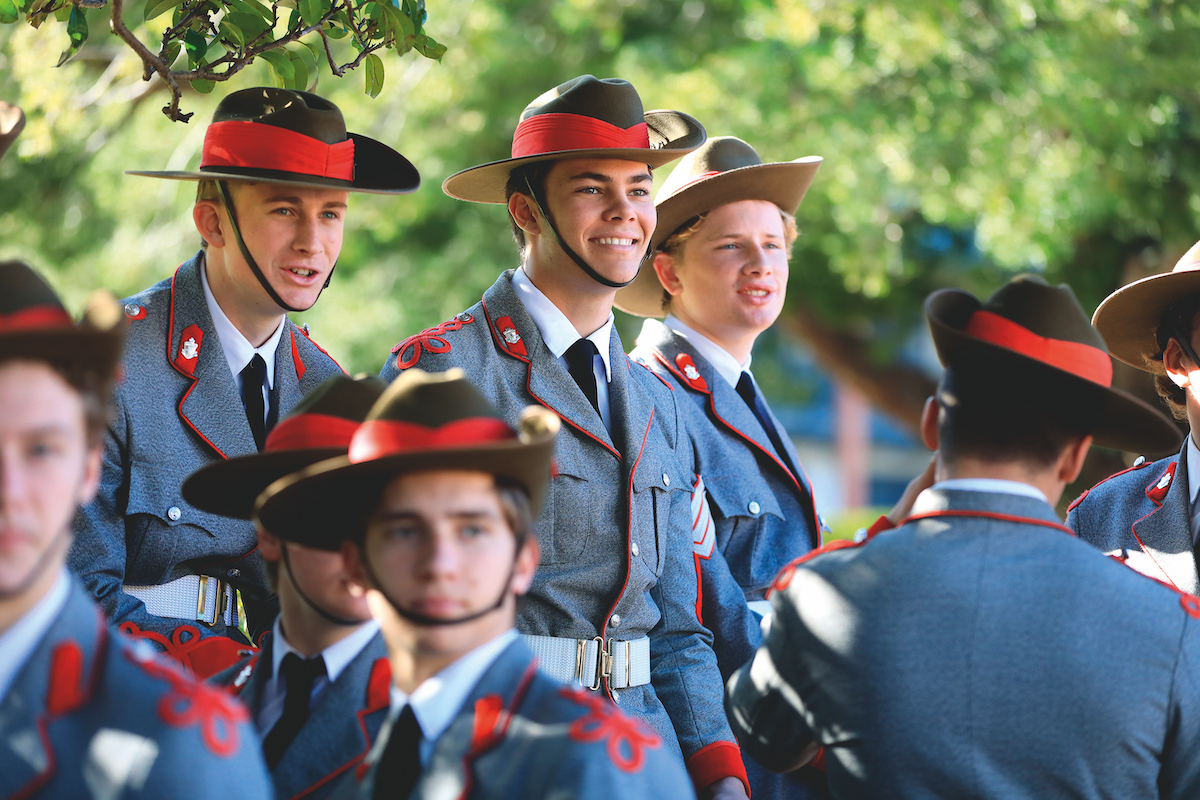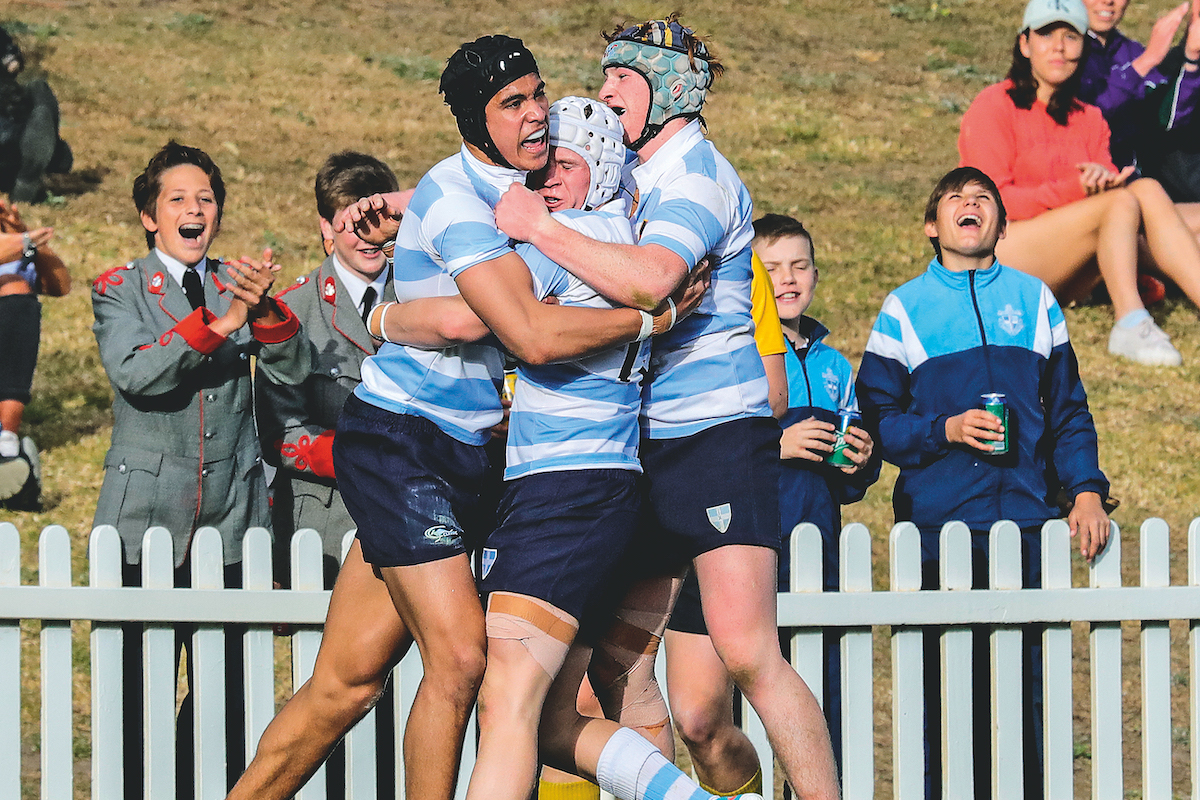When The King’s School opened its doors in the Sydney suburb of Parramatta in February 1832, there were just three boys in attendance. Despite this rather inauspicious opening, numbers quickly grew and by the end of the year there were nearly 100 students. From day one, the School prided itself on offering not only academic excellence, but also character development. This was a place where boys would develop into quality young men with integrity and Christian values, who would eventually become Australia’s next generation of leaders.

Nearly 200 years on, King’s is Australia’s oldest independent school and possibly its best known. With more than 2,000 students across its three campuses, the School has grown considerably since its early days, but still remains true to its founder’s ambitions. Headmaster Tony George acknowledges that one of the most challenging aspects of his job is ensuring the School continues to honour its rich history, while also providing an education that meets the needs of students in the 21st century.
“When you’re working in the for-profit environment, if you need to change, then you change,” Tony says. “But in schools, you have a history and a tradition that informs the identity of that school and you need to respect, celebrate and honour it as you move into the future. So there is that tension between staying true to yourself and your identity, while at the same time being sufficiently agile to respond to different trends and movements within the educational market space, which is moving very, very quickly.
“To give you some perspective, I’ve got Old Boys who were at the school 50 years or more ago, and I’ve got boys at the School now who will still be around in 50 years’ time. So, I’m dealing with a customer base that spans a century; 50 years into the past and 50 years into the future. What the School was 50 years ago needs to resonate with what the School will be in 50 years’ time. I can’t think of any other industry or product line that has that kind of challenge.”
“What the school was 50 years ago needs to resonate with what the school will be in 50 years’ time.”
While academics is certainly an important aspect of King’s, Tony points out that fundamentally the School has always been focused on developing Christian character and integrity.
“If you think of the conundrum, are great leaders born or made? Regardless of whether they’re born or not, at King’s they’re certainly made. We think about King’s as where leaders are made. It’s not the knowledge and skills that make them, that’s just their toolbox. It’s what they do with that toolbox,” he explains. “The difference between a CEO and a great CEO is not their toolbox; what makes the difference is their character. Now, character is not something you can pick up in a university course; character is what’s forged within the community of a residential school like King’s.
“Even though our students might not be CEOs for another 10, 20, 30 or 40 years, what we need to do is make sure that this character and integrity fully takes hold now, so that when they then go off to university and do their studies, they’re taking on the toolboxes that will then complement their character and integrity as leaders in business, government, community organisations and so on. That’s what we’ve always done and that’s what we’re always going to do.
“So, my challenge at King’s is, how do I provide an environment in which the future leaders and CEOs of our country can grow and be formed?”
“Are great leaders born or made? Regardless of whether they’re born or not, at King’s they’re certainly made.”
Beyond academic excellence
Although King’s is not a selective school, it is committed to academic excellence. In fact, it has been recognised as one of Australia’s highest achieving non-selective schools, regularly ranking among New South Wales’ Top 50 schools in the HSC results. However, Tony believes academics is not the main reason that parents choose to send their children to King’s.
“There’s no doubt families want a good academic education for their child, but I find they don’t tend to choose the school based on the academics, because in many respects that’s expected. It’s a bit like a five-star safety ANCAP rating on your car, you expect it. If the car doesn’t have the rating, you’ll go and buy some other car. It’s on your checklist, but you want more than that,” he reasons.
“So, when parents are looking at sending their son to King’s, I say to them, ‘Look, if all you want is an academic education for your child, please take them somewhere else. Because, yes, they will get a great academic education here, but they’ll get so much more. They will be young men of vision, character and integrity, ready to take on the issues of our world in whatever environment or context they find themselves.’”
According to Tony, some of the major problems we are facing in this century, such as famine, climate change and pollution, are much more than scientific problems. He argues that science is a useful tool for addressing these global issues, but fundamentally, they are human problems that will be solved by people.
“The difference between a CEO and a great CEO is not their toolbox; what makes the difference is their character.”
“So, you need to have a certain quality of person, a certain quality of leader or CEO, who is prepared to step out and make a significant impact for the good of the global society, through their ability to influence, inspire and motivate people around them,” he asserts.

Learning through failure
One of the other messages that Tony conveys to prospective parents is that attending King’s is certainly not for the faint-hearted. “If you’re a parent who wants to wrap your kid up in cotton wool, don’t bring him here,” he chuckles.
“This is an adventure and it’s a bit like an educational resort. It’s laid on thick for the boys, from what they’re learning in the classrooms, to the Cadet Corps and Duke of Edinburgh, to sports, performing arts and leadership development.”
Tony jokes that the students are kept so busy with the extensive co-curricular program that they have no time to get up to mischief. “Boys and spare time don’t really go well together,” he laughs. “They’re quick to come up with a lot of ideas, not many of them good.” The structured environment at King’s not only keeps the boys out of trouble, but also helps to develop discipline and resilience.
One of the most unique aspects of studying at King’s is the military identity instilled in the students through participation in the Cadet Corps. One of Australia’s oldest and largest cadet programs, it’s a compulsory activity for Years 9 and 10 and is optional for those in Year 11 and Year 12.
More than 500 boys participate in the military-style training program each year, allowing them to experience discipline, teamwork and character-building exercises. The annual Cadet Camp further tests and challenges students through a variety of outdoor education experiences. “Our boys don’t just put on their cadet uniform as a co-curricular activity, they actually live it,” Tony enthuses.
“Our boys don’t just put on their cadet uniform as a co-curricular activity, they actually live it.”
The School’s strategy is defined by three essential pillars: academic excellence, character development and Christian community. “These are the three main distinctives that feed into or develop our boys to be global thought leaders,” Tony says.
“One is obviously academic excellence, because you need to have a good quality of mind to be able to lead well, but that’s not sufficient; it’s essential to also have good character. The third element is that of community. Our community provides a context of belonging, mateship, camaraderie and attachment that’s very important for one’s security. Now, from that base you then move out into developing character.”
The way we learn, Tony explains, is not through success, but through failure. “An example of this is that you don’t see babies sitting back watching YouTube videos on how to learn to walk and then saying, ‘Right, I think I’ve got it now, here we go,’ and then walking. First, we need to trip and fall before eventually we get the hang of it,” he points out.
Tony believes the same principle applies to developing character. “We believe that the boys need to fail well, fail fast and fail often. Where can they fail without anybody having to die; without it having to be catastrophic? The answer is in things like sport, outdoor education and performing arts. I don’t mean that the failure is about losing a game of sport, but you might drop the ball, miss the pass or miss the tackle. You’ve let your mates down at that point and you have to deal with the fact that you’re not perfect. You’ve got to pick yourself up and strive on through it,” he says.
“This is where outdoor education and cadets is really important, because they’re contexts in which the boys lead the boys. If you fail in class, then you’ve let your teacher down, but if you fail on expedition, you’ve let your mates down. So not only does it teach them outdoor education skills, but it plays a significant role in the development of character and integrity.”
Tony adds that this means the boys become responsible for their own actions rather than blaming others and they also learn to make decisions when they need to be made. “You don’t want a CEO who gets caught up in analysis paralysis or a CEO who is quick to blame other people and point the finger elsewhere. You also don’t want a CEO who’s going to laud it over others and bully others. You really want a CEO who is able to work with others, inspire, enthuse and motivate them to be able to commit themselves for the common good and actually get the best out of them as a team,” he says.
“That’s the advantage of something like cadets. It’s ordered and structured and it provides a great environment of safety, so that our boys are looked after and cared for, but at the same time it provides a context in which they really do need to push themselves and almost step beyond their limits. If you can’t face your own limits and understand your own limits, then please don’t lead someone else. You’ll take them over a cliff.”

For the good of society
From the moment King’s opened its doors, the School’s purpose has been about far more than simply educating its students. “The education in The King’s School is not for the exclusive benefit of those upon whom it is bestowed, but for that of the entire community,” Archdeacon William Grant Broughton declared upon the School’s opening in 1832. Despite the fact that nearly two centuries have gone by since those powerful words were uttered, Tony says the sentiment still remains relevant to the School today.
“It’s a delightful quote and it really runs deep in the DNA of the place,” he smiles. “It’s symbolised in our uniform, because our boys wear the oldest military uniform worn in Australia. It’s a very distinctive uniform. Some people look at the uniform and regard as a bit antiquated, or even potentially misogynistic and patriarchal. The point I make to our boys is that there are other schools that have almost business-like suits, which are more about prestige and entitlement, whereas our uniform symbolises one who lives under authority and is prepared to live their life in service for others.”
While some people associate the military with wars and world domination, Tony believes that couldn’t be further from the truth. He distinctly remembers a conversation he had several years ago with Lieutenant General Rick Burr, Australia’s Chief of Army.
“Rick and I were sitting in a canoe on the Zambezi River in Zambia and he said to me, ‘The Australian Army is fundamentally about providing relief, rescue, service and support to the world. It’s about logistics. A lot of people think it might be about firing a rifle, but what we spend most of our time doing is moving lines of service for the world,’” Tony recalls.
“That’s such a lovely reframing of the uniform; the King’s uniform was to symbolise that every boy at the School was to live in the King’s service; to plead the cause of the widow and the fatherless and those who were in need. So I don’t think there could be a better uniform than the one our boys wear. Every day, when they get up and put it on, they’re reminded that they’re prepared to live their lives with guidance and for the benefit of others. They would even lay down their lives if need be, as sadly hundreds of our boys have done in various conflicts around the world.”
One school, three campuses
The King’s School is divided into three campuses. Catering for boys in Pre-Kindergarten to Year 6, the Preparatory School is located within the School’s 320-acre Parramatta property encompassing lakes, lawns, gardens and woodland. The Senior School, for boys in Year 7 to Year 12, is also situated within the expansive Parramatta parklands. Meanwhile, Tudor House is a co-educational school in the New South Wales Southern Highlands catering for children in Pre-Kindergarten to Year 6.
Brothers in arms
Several decades ago, the term ‘boarding school’ had negative connotations, with fed-up parents making idle threats about sending their misbehaving children away from home. But Tony insists times have changed. “If we go back to last century, boarding school was perceived as living in the shearers’ quarters and being punished, sent away from home,” he laughs. “It’s now quite the opposite; the facilities, care and support at King’s is just outstanding.”
Of the 1,500 boys who attend the Senior School, about 380 are boarders. These students are cared for by 50 staff members who live on campus with their families. This creates a genuine family environment, with boarders, staff, babies and dogs all living happily together.
“It’s quite a village, and that village really sets the tone of the place,” Tony says. “My wife and I live on site and we still have two kids at home and three dogs. The whole place is just alive 24/7. We’ve got more sporting fixtures on a Saturday than you find on Fox Sports.”
Prior to taking on the role as the 20th Headmaster of King’s, Tony and his family were living in Perth, where he was Principal of St Stephen’s School. Tony’s youngest son moved to Sydney several months before the rest of the family and became a boarder at King’s.
“When we moved on site, he continued to board because he wanted to be in with his mates,” Tony recalls. “It gave us a good insight as parents as to what the boarding community is like, and it’s a delightful place.”
Situated on 320 acres of beautiful parkland complete with lakes, lawns, gardens and woodland, the vast campus provides a safe environment in which the boys are free to play, run and explore. “I describe it as a boys’ adventure playground,” Tony says. “You’ve got a gym where you can bulk up, a swimming pool or you can play footy with your mates. There’s also the music school if you’re into performing arts. And there’s a restaurant where the food is just there on-call whenever you need it. It’s really quite extraordinary.”
While Year 7 students are grouped together in one boarding house as part of an induction program, the other houses are all vertical, with students from Year 8 to Year 12 grouped together. “The boys like it that way,” Tony says. “It’s like living with your brothers; there are older brothers and younger brothers. We place a lot of emphasis on that notion of community within the School.”
King’s was instrumental in the development of rugby union in Australia, playing in the first interschool game against Newington College in 1870. Since then, 28 former students have played for the Wallabies.
Within the boarding houses there is a sense that mateship and lifelong friendships are formed with strong loyalties to the School. The day boys don’t miss out on this camaraderie though, as they are placed in their own dedicated houses. “It’s very much a residential experience, even if you’re a day boy,” Tony enthuses. “It’s not like any other day school; the way in which the boys are committed to their particular houses is very Hogwartian.”
Tony explains the atmosphere is very much like a seaside holiday town. The residents, he says, create the character of the place, while the holidaymakers bring the energy. “At King’s, it’s our boarding community that really sets the tone and the culture of the place, and then our day families and day boys come here and they bring the energy,” he says, adding that the dining experience also helps to create a communal atmosphere.
“It’s not just about feeding the boys; it’s very much a cultural experience, with every boy sitting down with each other and the staff, every lunchtime, and talking with one another. That is a unique aspect of this school that you won’t find anywhere else. We deliver 1,600 meals in an hour every day, in order to provide that common eating experience for the boys.”
Tony adds that he is incredibly proud of the diversity within The King’s School – with the community reflecting the rich and wonderful diversity of North West Sydney in which it is located.
“It’s something that I love about our school – that our student demographic reflects the Australian demographic,” he comments. “When you look across our playground and across our entire school, we’ve got boys from every nationality learning and playing alongside each other.”

The art of growing people
When asked what he enjoys most about his role as Headmaster, Tony breaks into a wide grin. “Oh, that’s easy, the boys!” he exclaims. “Boys are boys no matter where they are. They’re cheeky and they’re excited, they’re at the beginning of life, they’re making plans, they’re making decisions, they’re cracking jokes, they’re having a lend of you.”
Although Tony certainly has a great rapport with his students, he hasn’t always worked in the education sector. After starting out his career as a science teacher, Tony left to pursue a career in business management. After a decade, he found himself “drawn back into the meaningful art of growing people” and has worked in educational leadership ever since.
“My philosophy of education is not merely about the tradition of knowledge and skills, but more about how we grow people, and that’s complex,” he adds. In the independent schools’ sector, Tony says there are three spheres of influence: education, theology and management. “So, you need a rather interesting toolbox,” he quips.
“My philosophy of education is not merely about the tradition of knowledge and skills, but more about how we grow people, and that’s complex.”
One of the biggest challenges Tony faces in his role is managing the expectations of multiple stakeholders. “When I was operating in the profit space, everything was aligned nicely around maximising shareholder value, so that’s pretty straightforward. The not-for-profit or the for-purpose space has a lot more layers to it, because you’re creating environments of meaning, purpose and significance for so many different people in so many different ways. It’s far more complex than any business I’ve ever run or any organisation I’ve worked in, but that’s the delight of it,” he says.
As Tony looks to the future, he’s excited by the potential that King’s has to become a school of global significance. “That’s something that we’re really focusing on, given that we’re in the global century and being in the global century means that we need to be globally minded,” he says.
Within the next few decades, technological advances in air travel promise to drastically shorten flying times. This presents a huge opportunity for a school such as King’s. “We’re being told that in a decade or so there will be planes that will get from Sydney to London in four hours. This means that boys in Shanghai or Beijing could effectively travel to King’s as weekly boarders,” he says.
“When I think of the student of the future, there might be a family in the subcontinent who wants their son educated at King’s in Australia before doing further study in North America to look after the family’s affairs in Africa. It’s going to be a very different kind of world, but the degree of travel and movement is going to be much easier.”
Ultimately, Tony believes King’s is in a position to create leaders that will make a significant impact on a global scale. “The 320 acres that we have here in Parramatta is a unique geographic footprint. We need to position this as the training ground for future leaders. These are the fields that will give rise to the leaders and CEOs of not just Australia’s future, but the world’s future,” he says.
“These are the fields that will give rise to the leaders and CEOs of not just Australia’s future, but the world’s future.”
“Who are the people that are going to feature on the front cover of The CEO Magazine in years to come? Well, it’s those whose character is being forged in our schools today. So, we all need to commit to the formation, growth, development and encouragement of people of character and integrity in school. It’s not just knowledge and skills that are important, but also wisdom, discernment, judgement and character.”


